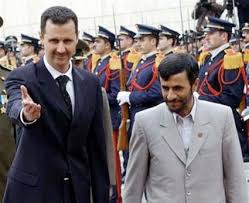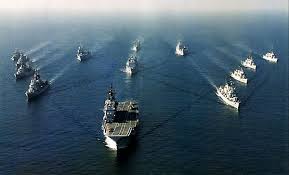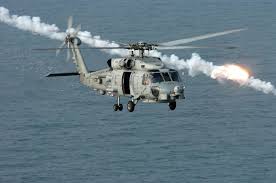MORE INSIGHTS INTO THE SCENARIO THAT WORLD WAR 3 IS VERY MUCH ON THE HORIZON!!!


May 7, 2013 – IRAN – Iranian Deputy Foreign Minister for Arab and African Affairs Hossein Amir-Abdollahian says the Islamic Republic will not allow the enemies and the Israeli regime to weaken the resistance axis. In a meeting with Cuban Deputy Foreign Minister Rogelio Sierra Diaz in Tehran on Monday, Amir- Abdollahian denounced the recent Israeli aggression against a research center in Syria and called on the international community to take firm action against it. “The Islamic Republic of Iran is holding consultation and talks with regional and international sides in this regard to hold a broad meeting in Tehran in support of the Syrian people in the presence of regional and international countries and players, including Cuba,” the Iranian official stated. On Sunday, Syria said the Israeli regime had carried out an act of aggression against a research center in a suburb of Damascus, following heavy losses of al-Qaeda-affiliated groups at the hands of the Syrian army. According to Syrian media reports, Israeli rockets struck the Jamraya research center. Amir-Abdollahian stressed the importance of holding consultation between Tehran and Havana about the “rapid and influential” developments in the Middle East and urged Cuba to play an active role given its revolutionary background and its anti-Zionism and anti-arrogance approaches. He said the US and the Israeli regime seek to resolve their strategic woes by making efforts to inflict damage on Syria and the resistance axis and added that they even seek to spill over insecurity to Iraq. However, such efforts would be foiled through the vigilance of the Iraqi government and nation, the Iranian official emphasized. The Cuban deputy foreign minister, for his part, said that his country would make efforts to play an active and constructive role in the Middle East developments and to support regional nations and the resistance axis. Sierra Diaz warned of a main plot against Syria and said certain countries are resorting to different means to damage and destroy the Arab state. He expressed Cuba’s opposition to foreign interference in Syria and said Havana supports Iran’s political plan to end the violence in Syria and hold national dialogue in the crisis-hit country. Syria has been gripped by deadly unrest since March 2011, and many people, including large numbers of government security forces and army personnel, have been killed in the violence. –Press TV
Israel on war alert: Israel’s two air force strikes on Syria in three days – the second targeting the emblems of Assad rule overlooking Damascus from Mt. Qassioun – appear to be part of a tactical plan put together by the US Israel, and two Sunni powers, Turkey and Qatar, to break up the Tehran-Damascus-Beirut radical bloc and eventually force Iran to give up its nuclear bomb aspirations. This is how it will be interpreted by Supreme Leader Ayatollah Ali Khamenei, Bashar Assad and Hassan Nasrallah as they prepare their responses for the Israeli attacks. Without officially confirming those strikes ever took place, Israel insisted that its air force and rockets singled out the  advanced Iranian weapons waiting in Syria for transfer to Hizballah – and Hizballah itself. This message was designed for a purpose: It was meant to support Washington’s argument to Moscow that Israel had not aimed its bombs and rockets against Assad and his army – only the Iranian and Hizballah military presence in Syria. But it didn’t quite work that way, because no one in Damascus slept a wink early Sunday, May 5, as Israel rocket blasts shook the city in what was described as a 4 magnitude earthquake and inflicted heavy casualties – not on the Hizballah brigades fighting in Syria, but Syrian elite units stationed around Mt. Qassioun. The columns of fire over Damascus flashing across world screens caused the Assad regime and army serious loss of face. Syrian officials could do no less then broadcast dire threats of war, but may be poised to do more. Monday, May 6, the Syrian ruler spelled out his next plan of action in a message posted to Moscow: A third Israeli strike would incur an instantaneous Syrian response, he warned. Damascus would let Palestinian organizations off the leash to mount attacks against Israel from the Syrian Golan. What this presages, according to our military sources, is the launching of a cross-border war of attrition mounted from Syria and Lebanon by Syrian and Hizballah soldiers posing as Palestinian fighters. That is if Israel continues its assaults on Syria. Iran’s Foreign Ministry Spokesman Ramin Mehmanparast said Monday that Israel’s “acts of aggression against Syria will not go unanswered and Tel Aviv will receive a crushing response.” Washington is, meanwhile, expected to follow up on the Israeli operation in Syria by the end of May, early June, with operations ranging from US arms supplies to the Syrian rebels to demolishing Syria’s air force facilities and missile sites by US air strikes from Turkey, Europe and Israel. Barak Obama used this tactic to overthrow Muammar Qaddafi in Libya two years. –Debka
advanced Iranian weapons waiting in Syria for transfer to Hizballah – and Hizballah itself. This message was designed for a purpose: It was meant to support Washington’s argument to Moscow that Israel had not aimed its bombs and rockets against Assad and his army – only the Iranian and Hizballah military presence in Syria. But it didn’t quite work that way, because no one in Damascus slept a wink early Sunday, May 5, as Israel rocket blasts shook the city in what was described as a 4 magnitude earthquake and inflicted heavy casualties – not on the Hizballah brigades fighting in Syria, but Syrian elite units stationed around Mt. Qassioun. The columns of fire over Damascus flashing across world screens caused the Assad regime and army serious loss of face. Syrian officials could do no less then broadcast dire threats of war, but may be poised to do more. Monday, May 6, the Syrian ruler spelled out his next plan of action in a message posted to Moscow: A third Israeli strike would incur an instantaneous Syrian response, he warned. Damascus would let Palestinian organizations off the leash to mount attacks against Israel from the Syrian Golan. What this presages, according to our military sources, is the launching of a cross-border war of attrition mounted from Syria and Lebanon by Syrian and Hizballah soldiers posing as Palestinian fighters. That is if Israel continues its assaults on Syria. Iran’s Foreign Ministry Spokesman Ramin Mehmanparast said Monday that Israel’s “acts of aggression against Syria will not go unanswered and Tel Aviv will receive a crushing response.” Washington is, meanwhile, expected to follow up on the Israeli operation in Syria by the end of May, early June, with operations ranging from US arms supplies to the Syrian rebels to demolishing Syria’s air force facilities and missile sites by US air strikes from Turkey, Europe and Israel. Barak Obama used this tactic to overthrow Muammar Qaddafi in Libya two years. –Debka
 Explosions reported in Iran: A journalist working for BBC in Iran reported that explosions were heard near a missile base in Tehran. According to report, residents in the western section of the Iranian capital claimed that three explosions occurred, including in the Karaj neighborhood and Shahriar district, from the direction of an area where missile development research institutes and missile stockpiles are located. At this stage, the report has not been verified by other sources, nor have there been reports as to the cause of the alleged explosions. –Israel Defense
Explosions reported in Iran: A journalist working for BBC in Iran reported that explosions were heard near a missile base in Tehran. According to report, residents in the western section of the Iranian capital claimed that three explosions occurred, including in the Karaj neighborhood and Shahriar district, from the direction of an area where missile development research institutes and missile stockpiles are located. At this stage, the report has not been verified by other sources, nor have there been reports as to the cause of the alleged explosions. –Israel Defense


41 nations involved in naval exercise: The United States and its allies are preparing for naval exercises in the Gulf energy export hub that will include minesweeping and escorting commercial ships in a region where Iran is seen as a threat both to trade and security. Forty-one countries are taking part in the two-week International Mine Countermeasures Exercise (IMCMEX-13) to practice minesweeping and protecting ports and energy installations in the Gulf. Vice Admiral John Miller, Commander of the US Naval Forces Central Command, said on Monday the annual exercise was an “opportunity to enhance international naval capability to preserve freedom of navigation in international waterways. If 41 nations are willing to come here and practice MCM, just imagine how effective the global mine response would be if someone actually put mines in the water.” Iran repeatedly threatened to block the Strait of Hormuz, east of Bahrain, in early 2012 during heightened tensions with the West over Tehran’s disputed nuclear program. Iranian threats to block Hormuz have since subsided, but the nuclear impasse remains. There is also growing unease in the Middle East over Gulf Arab support for rebel uprisings against Tehran’s ally, Syrian President Bashar Assad. Dropping mines is one way to disrupt shipping through the narrow route through which most of the Gulf’s oil and gas is exported and many of the goods it consumes are imported. The phase of the exercise staged on water, which begins next week, will involve 35 ships, 18 unmanned underwater vehicles and dozens of underwater explosives disposal divers. In addition to minesweeping and flying drones, this year’s event will include oil spill crisis management and protecting offshore terminals that oil and gas exporters rely on. Last year’s exercise included Britain and France, several Middle Eastern states and countries from as far afield as Estonia and New Zealand. The countries taking part this year have not been named. -JP
No comments:
Post a Comment